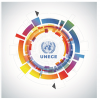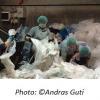News
Displaying Results 76 - 100 of 106
By Ms. Olga Algayerova, UN Under-Secretary-General and Executive Secretary of UNECE, and Ms. Elisabete Quintas da Silva, Head of Department, Sustainable and Efficient Use of Resources Operational Programme, Government of Portugal, and Chair of the UNECE Committee on Environmental Policy.
This…
Migration is an old and growing phenomenon – the United Nations Populations Division estimates that around 266 million people live outside their country of origin. In the UNECE region, by 2019 there were around 45 million people from Eastern Europe and Central Asia living abroad, with more than…
Both innovation and Public-Private Partnerships (PPPs) are essential drivers of economic development, environmental sustainability and social inclusiveness.
The UNECE region was hit hard by the COVID-19 crisis, not only because of the health crisis itself but also, even as the threat recedes…
Innovation has huge potential to drive sustainable development if supported by a vibrant innovation ecosystem. This requires effective linkages and collaboration at national level, and an innovation culture nurtured by a system of support to start ups and institutions such as business incubators.…
Integrated management of water, energy and land resources, while protecting ecosystems, remains a substantial challenge in the Western Balkans. The Water-Food-Energy-Ecosystems (WEFE) Nexus approach offers solutions that can reconcile potentially conflicting interests as they compete for the same…
The extraction of raw materials worldwide has more than doubled since 1990 and could double again by 2060 in the absence of corrective policies. According to the UN International Resources Panel, resource extraction and processing account for 90% of global biodiversity loss and water stress impacts…
UNECE continues to help its member States to respond to COVID-19 crisis. As part of this work, Guidelines and Best Practices for Micro-, Small and Medium Enterprises in Delivering Energy-Efficient Products and in Providing Renewable Energy Equipment developed earlier are being customized for North…
A small sub-set of small- and medium-sized enterprises – innovative, high-growth enterprises (IHGEs) – play an outsize role in innovation and structural transformation across the world. They spearhead experimentation with new ideas to create value, address challenges, and reduce transaction costs…
The Government of Ukraine is currently implementing a broad policy agenda aimed at achieving the Sustainable Development Goals (SDGs) and pursuing a resilient, inclusive and sustainable post-COVID recovery. UNECE, together with UNDP, UNICEF and WHO, is supporting these efforts through a Joint…
The countries of Eastern Europe and the South Caucasus (the EESC sub-region), Armenia, Azerbaijan, Belarus, Georgia, the Republic of Moldova and Ukraine have come a long way in their transition from centrally planned towards market-based economies. After a difficult first decade following…
While consumer demand for sustainable goods is an important driver for change, regulation and policy change are essential if the world is to side-step a climate catastrophe and bend traditional linear economic models towards a circular economy and sustainable future. Until recently it wasn’t clear…
The 56 countries of the UNECE region, spanning from North America to Europe, the Balkans, the Caucasus and Central Asia, are major users and producers of natural resources. Efficiency in the domestic use of resources continues to increase in the region, but the overall material footprint, which…
The COVID-19 pandemic has hit the economy hard. Global GDP is estimated to have fallen by 3.5 in 2020, and even more steeply in parts of the UNECE region. International trade has been disrupted. Progress towards the UN Sustainable Development Goals has slowed down at a time when it would be…
Systemic deficiencies with regard to access to information, decision-making or compliance with environmental law can seriously threaten successful implementation of circular and green economy and sustainable development. Taking a case to court to advance a widely shared public interest remains an…
The COVID-19 pandemic has had a dramatic impact on cities and the wellbeing of communities. Cities and urban areas are at the frontline in the fight against the COVID-19 public health crisis and its socio-economic consequences. They also hold significant potential for recovering better by adopting…
Olga Algayerova
Women’s Day Blog
On the occasion of the International Women’s Day, I would like to pay tribute to all women leaders, and all women and men, girls and boys, who are empowering women and girls to build a better future for all!
The theme of this year’s International Women’s Day is…
With the COVID-19 pandemic, Trade facilitation has acquired even greater importance for the land-locked countries of Central Asia, as it helps remove burdensome formalities for their trade and transport operations. Simplifying and digitalizing procedures helps diminish physical contacts along…
Uzbekistan has shown remarkable growth in its transition from a centrally planned to a market based economy, with annual growth rates between 5 and 9 per cent since 2004. Innovation, namely fostering experimentation and collaboration between innovation stakeholders to find new ways for creating…
A circular economy is a paradigm which can contribute to reducing the economic, environmental and social costs of resource use, while at the same time strengthening economic competitiveness, reducing poverty, and providing better quality of life, in line with the United Nations 2030 Agenda for…
Whilst environmental degradation affects everyone on the planet, it affects the lives of women and men in different ways. Implementing environmental policies with gender considerations in mind can be more effective to understand target groups better, gain greater acceptability of policies and…
As globalization increases the diversity of innovative ways of doing business around the world, economies become ever more interdependent. Multinational enterprise groups, or MNEs, have operations in several countries, so counting up their economic impacts entails looking across borders to gather…
Waste has turned into one of humanity’s predominant challenges. The generation of hazardous waste increased from an estimated 259 metric tonnes in 2007 to 394 metric tonnes in 2015; the most significant increases were from lower middle-income and higher middle-income countries and despite policy…
Consumers are increasingly interested in making more environmentally and ethically aware choices when it comes to the clothes and shoes they wear, according to a series of recent studies. But the sector is awash with complex language and misleading labelling that makes it difficult for consumers to…
The current patterns of raw material consumption are unstainable and are becoming an existential threat to the planet.
The United Nations Framework Classification for Resources (UNFC) offers a solution to support a total transformation towards a sustainable resource management future. To…
The risk that advances in digital technology benefit those who are already online and could contribute to greater inequality within and among countries needs to be addressed by effective policies, leaving no one behind.
The United Nations system is engaged to help address these…
























